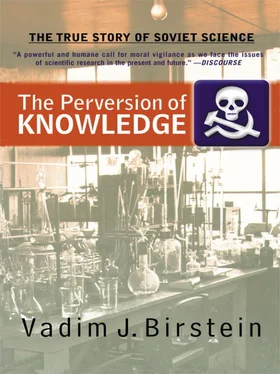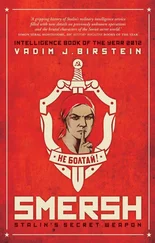I request and beg you to make my lot easier, to decide on my future and to allow me to work in my special field even at the lowest level… and to permit me to contact my family… about which I have no information more than year and a half.
I am sincerely requesting a rapid resolution of my case. 198
The letter has the signature of an NKVD official mentioned in Chapter 2: “True: Deputy Head of the 1st NKVD Special [Statistics] Department, Captain of Security Service Podobedov.” Podobedov was one of the people who supplied Mairanovsky’s Kamera with “birdies,” that is, victims for experiments. At this point, a still unknown decision concerning the fate of Vavilov had been made by Beria or, perhaps, Stalin. This decision was connected in some way with one of the main persons involved in the Mairanovsky affair, Sudoplatov. The following document was recently declassified:
INFORMATION
VAVILOV Nikolai Ivanovich, born 1887 in Moscow, before his arrest was Vice President of the Lenin Academy of Agriculture.
He was arrested on August 7, 1940, and accused in accordance with article 58 part 1a, article 58 parts 7–9 and 11 of the RSFSR Criminal Code.
The Military Collegium of the USSR Supreme Court condemned him to death by shooting.
The execution of the penalty was postponed. N. I. VAVILOV was enlisted under the 4th NKVD Directorate by Comrade Sudoplatov [sic] .
Deputy Head of the 1st NKVD Special Department, Security Captain Podobedov May 19, 1942 199
The original of this document has two handwritten penciled notes: “Com.[rade] Merkulov, I’d like to talk to you. L. P. Beria. 31/V–42,” and “Com.[rade] Sudoplatov. Report to C[omrade] Beria. I’d like to talk to you. M[erkulov]. 9/VI.” 200In other words, on May 19, 1942, Vavilov was put under the control of Sudoplatov’s NKVD Fourth Directorate, but he was still not pardoned. On May 31, NKVD commissar Beria had a conversation about Vavilov with his deputy, Merkulov. Sudoplatov reported to Beria on Vavilov’s transfer soon after June 9, 1942. Apparently, Sudoplatov also had a conversation with Merkulov about Vavilov shortly after June 9.
After conversations between Beria, Merkulov, and Sudoplatov on June 13, 1942, Merkulov sent a special letter to Vasilii Ulrich, chairman of the Military Collegium of the Soviet Supreme Court, regarding Vavilov and Luppol. The letter requested their sentences be commuted: “In view of the fact that the men under sentence referred to above might be used in work of importance for the country’s defense , the NKVD of the USSR petitions for death sentence to be commuted to detention in the corrective labor camps of the NKVD for a period of 20 years each” (emphasis added). 201
On June 27, 1942, in a special letter, Ulrich personally informed Gertsovsky, head of the NKVD First Special Department, that the Presidium of the Supreme Court had changed the sentence on June 23, 1942. 202The excerpt from the transcript of the meeting stated: “Due to the change in decision of the Presidium of the Supreme Soviet on July 26, 1941 No. 9/124cc, Paragraphs 283 [i.e., Vavilov] and 316 [Luppol], the death sentence of I. K. Luppol and N. I. Vavilov was commuted to detention in the corrective labor camps for a period of 20 years each.” 203On July 4, 1942, Vavilov was officially informed about the change in his sentence. 204
It is necessary to remember that in 1942 Sudoplatov was head, and later Eitingon was deputy head, of the new NKVD Fourth Directorate (Intelligence, Terror and Sabotage in the Enemy’s Rear) created in January 1942. 205One can only guess how Sudoplatov and his supervisors planned to involve Vavilov in terrorist activity. Did Beria (or Stalin) want to use Vavilov’s wide knowledge of foreign countries and many languages to assist Sudoplatov’s spies and guerrillas? Or would Vavilov, an excellent botanist, have been assigned to work at Mairanovsky’s laboratory as an expert on poisonous plants? Did Mairanovsky and Sudoplatov hope to find and test other plant poisons beyond ricin, and new narcotics and plant-derived “truth drugs”? The spring of 1942 was exactly the time when Mairanovsky was conducting his experiments with “truth drugs.” Or did Beria have information about Hitler’s plan to cultivate the Russian dandelion, Taraxacum kok-saghyz , for producing natural rubber, 206and think Vavilov should have been used for checking this idea, which was unrealistic for Germany? The NKVD/NKGB knew that in 1942 Germany did not have natural rubber and used only a synthetic substitute. 207
And what happened between July 4, 1942, when Vavilov was officially informed about the change in his sentence, and January 24, 1943, when he was moved from his cell to the prison hospital? Had he started to work for Sudoplatov from his cell? If so, what kind of work was it? There is nothing about Vavilov in Sudoplatov’s book: The KGB even now keeps its secrets.
Apparently, in 1944 Pryanishnikov found out about Vavilov’s death. 208But he continued fighting for Karpechenko. On July 20, 1945, Pryanishnikov appealed to Beria again. 209He asked Beria for an amnesty for Karpechenko because of the end of the war with Nazi Germany. “If it is not possible to apply the amnesty to G. D. Karpechenko, it is necessary at least to put him in conditions favorable for his work in the Narkomvnudel [i.e., the NKVD] system. His knowledge and talents should work for our Motherland,” wrote Pryanishnikov.
The old academician did not know that he was trying to help a dead person. As became known recently, on July 7, 1941, Karpechenko was tried along with Vavilov, Govorov, and Bondarenko. 210The primary materials about the investigation and the trial are still in the closed KGB/FSB archives. The four defendants were found guilty of “anti-Soviet activities” and “wrecking.” According to Vavilov’s testimony at the trial, Karpechenko “had supported his [i.e., Vavilov’s] program of wrecking which had diverted institutes [i.e., the VIR] from practical tasks of Soviet agriculture.” 211
Like Vavilov, Karpechenko was tortured during his NKGB investigation. In his last plea to the court Karpechenko said: “…I cannot confess my guilt. During the preliminary deposition, I did confess to all the charges brought against me. But I made this confession under duress of the methods used during the deposition.” 212On July 9, 1941, Karpechenko was condemned to death. His plea was denied, and on July 28, 1941, he was shot. 213
During the trial, Bondarenko, like Karpechenko, repudiated his previous testimonies against Vavilov. 214He had been accused that “since 1937 [he] was one of the leaders of an anti-Soviet wrecking organization in the system of the Agricultural Academy and was connected with agents of the American intelligence.” 215On July 9, 1941, the Military Collegium condemned Bondarenko to death, and he was shot on July 27, 1941, a day before Karpechenko. 216
The dates of the rejection of Vavilov’s appeal (July 26, 1941) and the death of Bondarenko (July 27, 1941) and Karpechenko (July 28, 1941) are almost identical. It seems that their appeals were reviewed by the Military Collegium the same day. It is still a mystery why Vavilov was left alive for a while, while the other two defendants were immediately shot. Either Beria or Stalin intervened, or the whole scenario was planned in advance. For some reason, Govorov was also kept alive. He died in 1943 in imprisonment. 217
The trial of Vavilov’s four colleagues arrested in Leningrad was postponed until the end of the war. On January 3, 1942, Senior Investigator Kuksinsky and head of the Investigation Group of the NKVD Leningrad Regional Department Klimov (the same Klimov who signed the above-mentioned secret letter to Stalin) signed the “Decision to Postpone the Investigation Because of the Impossibility of an Expert Evaluation.” 218Levitsky died in Zlatoust Prison on May 20, 1942, and Flyaksberger died in the same prison on September 13, 1942. 219In 1943, only Kovalev and Maltsev were still alive in imprisonment and their interrogations started again in May–June. 220The same “expert” commission that had worked on Vavilov’s case, consisting of A. Vodkov, A. Zubarev, V. Mosolov, and S. Chuenkov (minus Shundenko), gave its opinion on the Kovalev-Maltsev case. It is interesting that Lysenko himself wrote favorably about Maltsev in a kharakteristika (characterization) document he sent to the NKVD on February 20, 1940. 221Nevertheless, Kovalev and Maltsev were tried and convicted. They were released only in the mid-1950s. 222
Читать дальше











